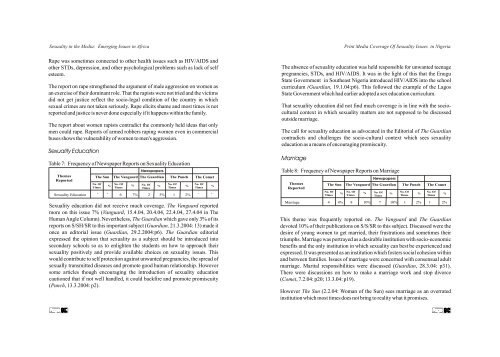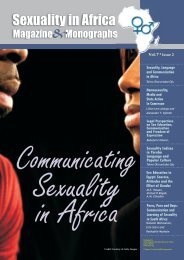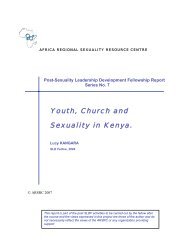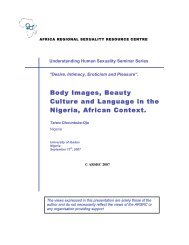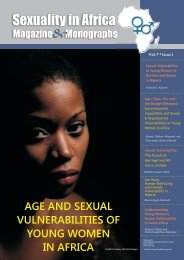Sexuality in Media: Emerging Issues in Africa - Africa Regional ...
Sexuality in Media: Emerging Issues in Africa - Africa Regional ...
Sexuality in Media: Emerging Issues in Africa - Africa Regional ...
You also want an ePaper? Increase the reach of your titles
YUMPU automatically turns print PDFs into web optimized ePapers that Google loves.
<strong>Sexuality</strong> <strong>in</strong> the <strong>Media</strong>: Emerg<strong>in</strong>g <strong>Issues</strong> <strong>in</strong> <strong>Africa</strong><br />
Rape was sometimes connected to other health issues such as HIV/AIDS and<br />
other STDs, depression, and other psychological problems such as lack of self<br />
esteem.<br />
The report on rape strengthened the argument of male aggression on women as<br />
an exercise of their dom<strong>in</strong>ant role. That the rapists were not tried and the victims<br />
did not get justice reflect the socio-legal condition of the country <strong>in</strong> which<br />
sexual crimes are not taken seriously. Rape elicits shame and most times is not<br />
reported and justice is never done especially if it happens with<strong>in</strong> the family.<br />
The report about women rapists contradict the commonly held ideas that only<br />
men could rape. Reports of armed robbers rap<strong>in</strong>g women even <strong>in</strong> commercial<br />
buses shows the vulnerability of women to men's aggression.<br />
<strong>Sexuality</strong> Education<br />
Table 7: Frequency of Newspaper Reports on <strong>Sexuality</strong> Education<br />
Themes<br />
Reported<br />
<strong>Sexuality</strong> Education<br />
The Sun The Vanguard The Guardian The Punch The Comet<br />
No. Of<br />
Times<br />
- -<br />
%<br />
No. Of<br />
Times<br />
%<br />
Newspapers<br />
No. Of<br />
Times<br />
No. Of<br />
No. Of<br />
% %<br />
%<br />
Times<br />
Times<br />
6 7% 2 3% 1 2%<br />
- -<br />
<strong>Sexuality</strong> education did not receive much coverage. The Vanguard reported<br />
more on this issue 7% (Vanguard, 15.4.04, 20.4.04, 22.4.04, 27.4.04 <strong>in</strong> The<br />
Human Angle Column). Nevertheless, The Guardian which gave only 3% of its<br />
reports on S/SH/SR to this important subject (Guardian, 21.3.2004: 13) made it<br />
once an editorial issue (Guardian, 29.2.2004:p6). The Guardian editorial<br />
expressed the op<strong>in</strong>ion that sexuality as a subject should be <strong>in</strong>troduced <strong>in</strong>to<br />
secondary schools so as to enlighten the students on how to approach their<br />
sexuality positively and provide available choices on sexuality issues. This<br />
would contribute to self protection aga<strong>in</strong>st unwanted pregnancies, the spread of<br />
sexually transmitted diseases and promote good human relationship. However<br />
some articles though encourag<strong>in</strong>g the <strong>in</strong>troduction of sexuality education<br />
cautioned that if not well handled, it could backfire and promote promiscuity<br />
(Punch, 13.3.2004: p2).<br />
The absence of sexuality education was held responsible for unwanted teenage<br />
pregnancies, STDs, and HIV/AIDS. It was <strong>in</strong> the light of this that the Enugu<br />
State Government <strong>in</strong> Southeast Nigeria <strong>in</strong>troduced HIV/AIDS <strong>in</strong>to the school<br />
curriculum (Guardian, 19.1.04:p6). This followed the example of the Lagos<br />
State Government which had earlier adopted a sex education curriculum.<br />
That sexuality education did not f<strong>in</strong>d much coverage is <strong>in</strong> l<strong>in</strong>e with the sociocultural<br />
context <strong>in</strong> which sexuality matters are not supposed to be discussed<br />
outside marriage.<br />
The call for sexuality education as advocated <strong>in</strong> the Editorial of The Guardian<br />
contradicts and challenges the socio-cultural context which sees sexuality<br />
education as a means of encourag<strong>in</strong>g promiscuity.<br />
Marriage<br />
Table 8: Frequency of Newspaper Reports on Marriage<br />
Themes<br />
Reported<br />
The Sun The Vanguard The Guardian The Punch The Comet<br />
No. Of<br />
Times<br />
%<br />
Pr<strong>in</strong>t <strong>Media</strong> Coverage Of <strong>Sexuality</strong> <strong>Issues</strong> <strong>in</strong> Nigeria<br />
No. Of<br />
Times<br />
%<br />
Newspapers<br />
No. Of<br />
Times<br />
No. Of<br />
No. Of<br />
% %<br />
%<br />
Times<br />
Times<br />
Marriage 4 4% 8 10% 7 10% 1 2% 1 2%<br />
This theme was frequently reported on. The Vanguard and The Guardian<br />
devoted 10% of their publications on S/S/SR to this subject. Discussed were the<br />
desire of young women to get married, their frustrations and sometimes their<br />
triumphs. Marriage was portrayed as a desirable <strong>in</strong>stitution with socio-economic<br />
benefits and the only <strong>in</strong>stitution <strong>in</strong> which sexuality can best be experienced and<br />
expressed. It was presented as an <strong>in</strong>stitution which fosters social cohesion with<strong>in</strong><br />
and between families. <strong>Issues</strong> of marriage were concerned with consensual adult<br />
marriage. Marital responsibilities were discussed (Guardian, 28.3.04: p31).<br />
There were discussions on how to make a marriage work and stop divorce<br />
(Comet, 7.2.04: p20; 13.3.04: p19).<br />
However The Sun (2.2.04: Woman of the Sun) sees marriage as an overrated<br />
<strong>in</strong>stitution which most times does not br<strong>in</strong>g to reality what it promises.


